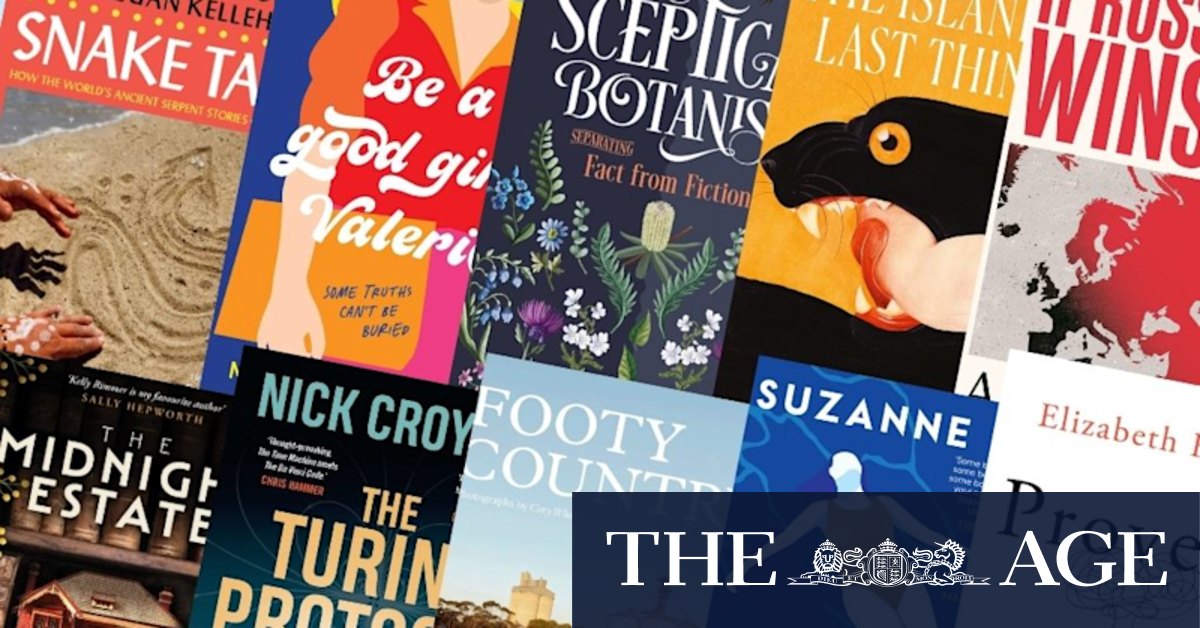Normal text sizeLarger text sizeVery large text size
It’s an eclectic mix of books from our reviewers this week, from speculative espionage to sceptical botany, from coastal crime to community footy. Happy reading.
FICTION PICK OF THE WEEK
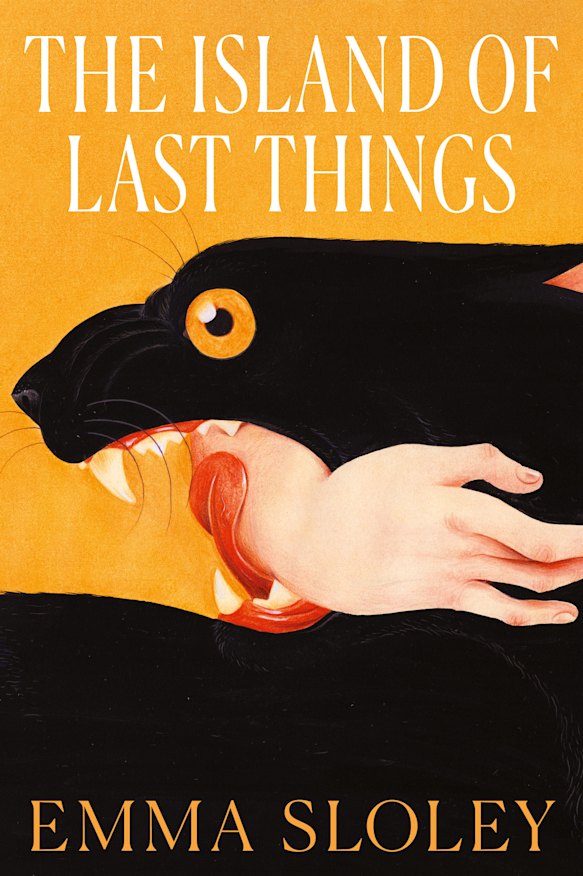
The Island of Last Things
Emma Sloley
Text, $34.99
It’s hard to escape the symbolism of a notorious prison – the island of Alcatraz, in San Francisco Bay – being repurposed to serve as the last zoo on earth. In The Island of Last Things, that’s exactly what’s happened, and the introverted Camille, a young woman more comfortable with animals than people, has worked there for most of her short career.
Ecocide has blighted life on the planet for all, and as species and whole ecosystems die out, even zoos become increasingly rare – defunded as an extravagance that can’t be indulged in when humans are fighting to survive. Alcatraz itself is, depressingly, the plaything of an unaccountable billionaire.
When middle-aged rabble-rouser Sailor arrives as a new zookeeper, straight from the freshly shuttered Paris Zoo, she shakes things up and promptly bonds with Camille over the animals. Sailor, the watchful Camille notes, is slowly hatching a wild plan … to smuggle the animals out of the private menagerie to somewhere they might have a future. Emma Sloley’s debut is sensitively written cli-fi – an elegy for the natural world that also bristles with urgent, life-affirming spirit.
The Turing Protocol
Nick Croydon
Affirm Press, $34.99
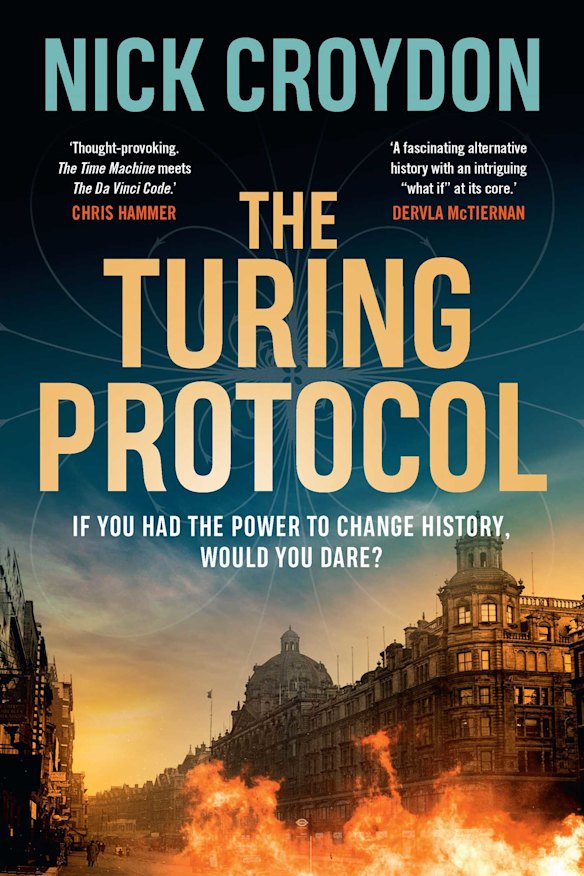
The Turing Protocol is speculative espionage fiction that ruffled feathers by speculating that Alan Turing fathered a secret child. The brilliant British codebreaker and pioneer of computer science was famously gay, and so infamously persecuted by the UK government because of his sexuality that he was driven to suicide.
This spy adventure doesn’t undermine that history, and in terms of plausibility, Turing is much likelier to have fathered a kid than he is to have invented a machine that can send messages back in time to the recent past, which is the book’s other main speculation. This powerful invention can directly change the future and is passed down through the Turing line, keeping it from the wrong hands. Croydon’s gambit lets the novel springboard into an alt-history thriller that roves from spies and codebreakers at the height of WWII to move and countermove in the current war in Ukraine. If Turing siring progeny isn’t strictly necessary to the plot, any claim of homophobia is a beat-up and will only give this otherwise rather ordinary thriller more attention than it deserves.
The Golden Sister
Suzanne Do
Macmillan, $34.99
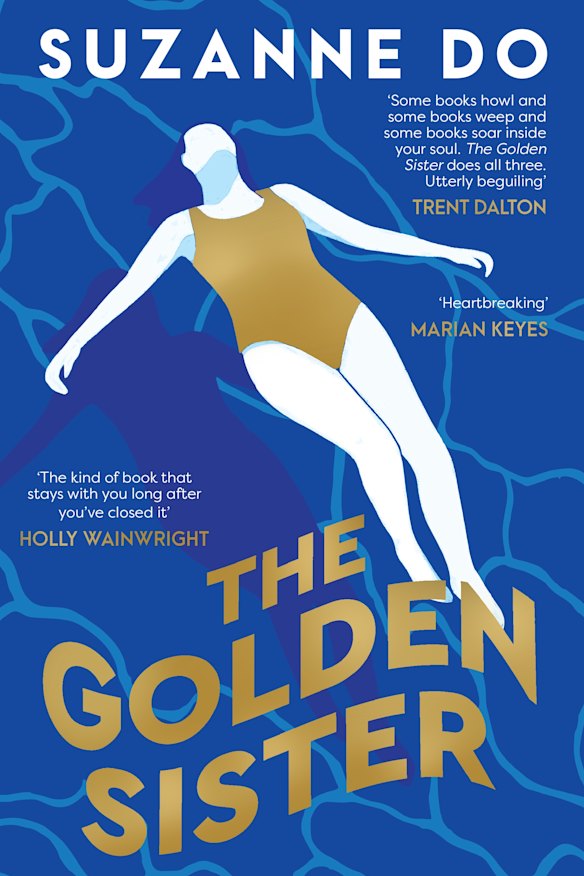
Set on the NSW South Coast in the fictional town of Swanning, The Golden Sister begins with the sudden death of Lili Berry’s twin sister Holly. She is found dead, police say, from a self-administered heroin overdose, but Lili has a hard time believing that, given her sister had upper limb injuries at the time and was notoriously uncoordinated as a kid. Her self-absorbed mum, Maz, always shamelessly preferred her sister growing up; Lili has worked hard to make a life for herself, struggling to overcome a sense of inadequacy. For her part, Maz warns Lili against prying into Holly’s death and remains standoffish, even hostile towards her surviving daughter. Lili ignores her, and her enquiries lead to her meeting Pete, the educated (apparently homeless) man who found Holly’s body. Pete knows unresolved grief – his son has been missing for 15 years – and together, he and Lili join forces to solve the mysteries, and cope with the losses that unite them. Suzanne Do’s debut deals in dark themes, but it has a lightness of touch, a slightly unhinged comic sense, and a feel-good arc to leaven them. A compact blend of coastal crime fiction, coming-of-age novel, and emotive family mystery.
Be A Good Girl, Valerie
Marcia van Zeller
Ventura, $32.99
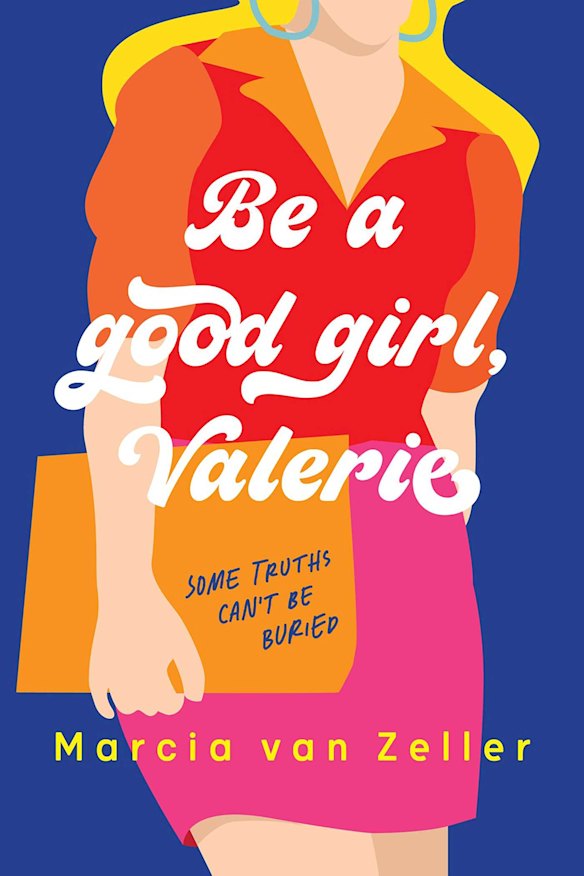
Be A Good Girl, Valerie revolves around an intergenerational alliance forged against sexual harassment and assault in the workplace. Sixty-ish Valerie has taken to wearing comfortable shoes, having long since welcomed the invisibility of middle age. When she discovers her Gen Z colleague Anna is being fired for refusing the boss’ unwelcome advances, it awakens traumatic memories from the 1970s.
Back then, Valerie was sexually assaulted by a famous figure in a culture that expected women to put up with it, which turned a blind eye to such abuses, and she’s not going to take it any more. Gathering a team to protest Anna’s mistreatment and to fight for her reinstatement, Valerie champions her young colleague while reflecting on her own struggle. Zeller has crafted a calm, unshowy novel of female friendship and solidarity in the face of victimisation. The characters are relatable; the situation faced is all too familiar. Winningly, Zeller’s #MeToo novel refuses to slide into didacticism, charming with a healthy dose of dry wit, anger at injustice, and a rousing portrayal of a woman finding the courage to stand against it.
The Midnight Estate
Kelly Rimmer
Hodder, $34.99
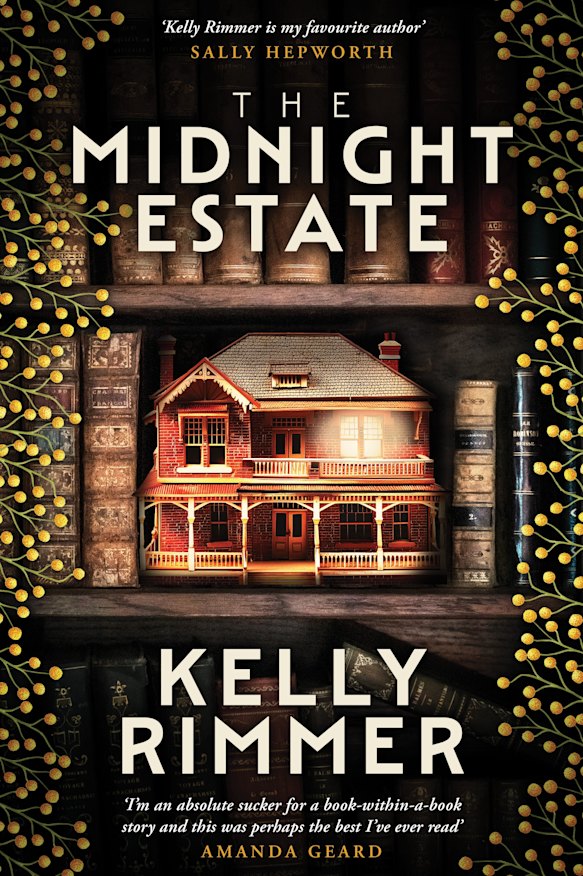
Heritage architect Fiona Winslow escapes her Sydney life to channel her energies into the ultimate restoration project. She retreats to Wurimbirra – the sprawling and neglected estate in Forbes where she grew up, raised by her single mum Ginny and regaled by stories told by her eccentric late Uncle Tad. A sense of homecoming soon gives way to unsettling gothic vibes. Locals believe Wurimbirra is haunted, and her mum becomes increasingly unnerved as Fiona dives into cleaning and restoring the ramshackle house. When Fiona finds a forgotten book called The Midnight Estate, the “novel within a novel” sheds refracted light on dark secrets kept behind closed doors. In addition to the metafictional twist, Rimmer invests her story with a spritz of romantic tension and an involving cast of characters, crafting a wrong-footing family mystery from which the long shadow of domestic horror and betrayal slowly emerges.
NON-FICTION PICK OF THE WEEK
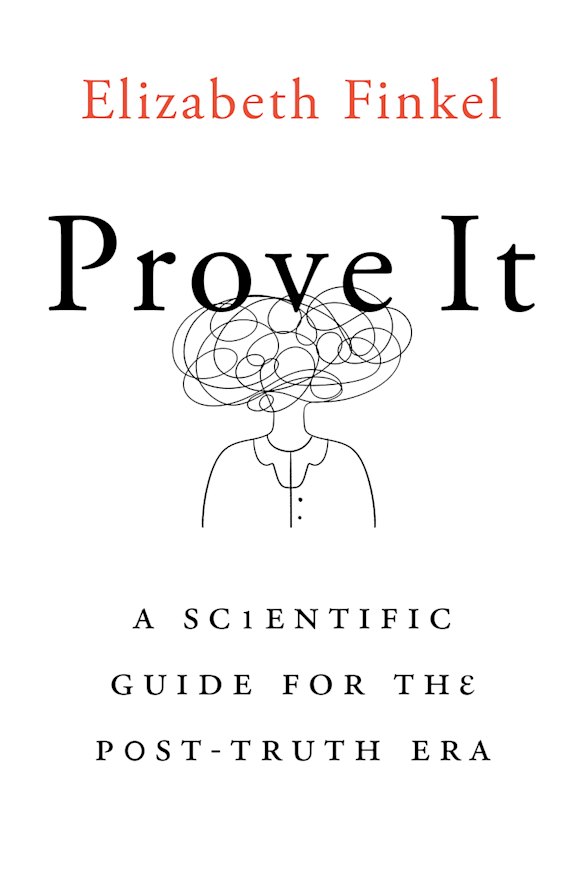
Prove It. A Scientific Guide for the Post-Truth Era
Elizabeth Finkel
La Trobe University Press, $36.99
In the 1980s, the Israeli-American psychologist Daniel Kahneman coined the term “adversarial collaboration”. The idea was that scientists from opposing camps would collaborate on experiments that would put their competing theories to the test. It is a practice that proved fruitful in the relatively young science of human consciousness, among other fields. While it is just one aspect of the scientific methods examined through the five controversial case studies in this book, it lingers in the mind as a potential model for conflict resolution and creating common ground between polarised groups in society. Other scientific disputes examined here include the disagreement over the origins of COVID and how Einstein’s prediction of gravitational waves was eventually proven correct. Central to the discussion is the way that philosophy – a discipline many modern scientists are often wary of – has guided scientific practice since its inception. This timely, stimulating work buzzes with the passion and rigour of scientific debate.
Snake Talk
Tyson Yunkaporta & Megan Kelleher
Text, $36.99
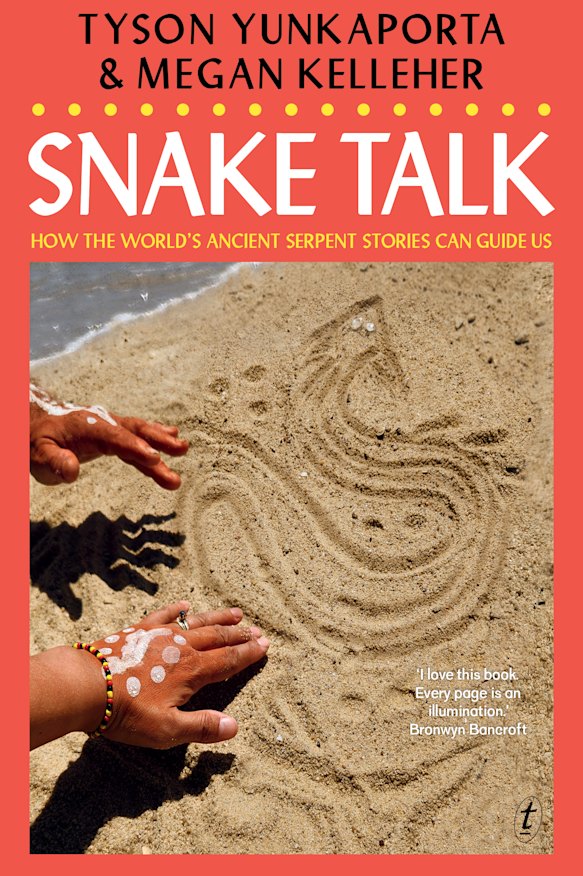
As he showed in his previous book Sand Talk, Tyson Yunkaporta is not shy of thinking big. Snake Talk, co-written with Megan Kelleher, continues in this vein as it ponders how the world’s ancient serpent stories might offer a path to re-establishing a balance between the global forces of creation and destruction. It’s an ambition that takes the authors on a physical and digital journey to yarn with keepers of snake lore in an array of Indigenous traditions from Zoroastrian Persia to the Toltecs of Central America. “We wonder if it might be possible for keepers of the old ways in every culture to activate their knowledge in collective firewalls against bastard technocrats, their bastard followers and their bastard robots.” The authors find no neat or easy solutions in these serpent stories. Instead, they “sing of the hero’s empathy, the victim’s wounds and the villain’s hunger”, as archetypal guides to navigating these alarming times. Like Sand Talk, the perspective is capacious yet intimate in tone; the narrative voice colloquial and straight-talking.
The Sceptical Botanist: Separating Fact from Fiction
Tim Entwisle
CSIRO Publishing, $39.99
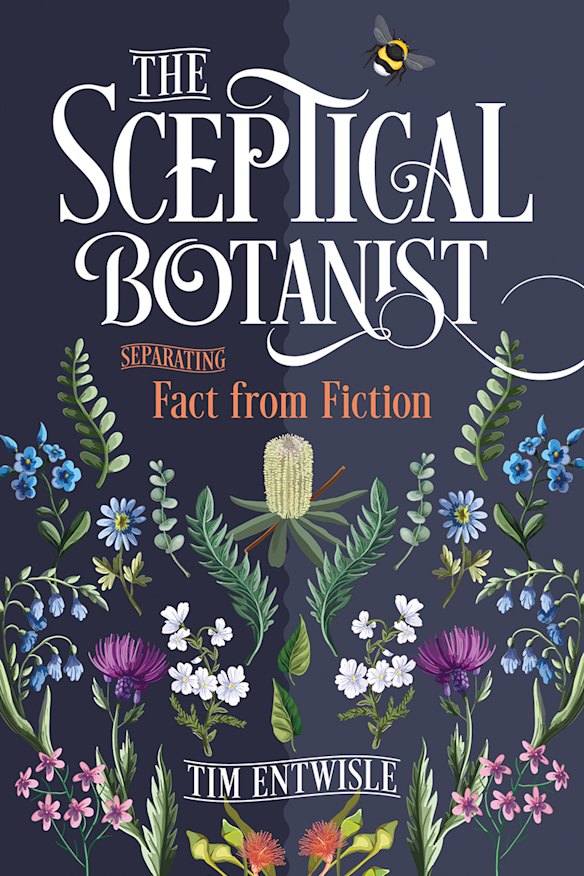
Tim Entwisle is a man leery of bandwagons. In this playful collection of essays, he reflects on trends in botanical thinking, urban myths about gardening, and his favourite pastime, plant nomenclature. When it comes to recent claims about the sentience of plants, he is dubious. Plants are clever, but to measure them against human intelligence is futile, he says. They should be valued on their own terms, not regarded as slow-moving fauna. In 2023, while he was director in Melbourne, it was decided that most of the gardens would be returned to the vegetation existing before European settlement because cultivating exotics was anachronistic. If you’re wondering why you never heard about this startling decision, it’s because he’s pulling our leg as a way of making a point about the importance of traditional botanical gardens. When he approved the removal of 10 old Moreton Bay figs from the Sydney Domain because they’d become unsafe, he copped some heavy criticism, including Alan Jones’ zinger that he was “a fat, lazy bureaucrat”. Most of it didn’t faze him, although “I was mildly offended by being called a bureaucrat”.
If Russia Wins: A Scenario
Carlo Masala
Atlantic Books, $22.99
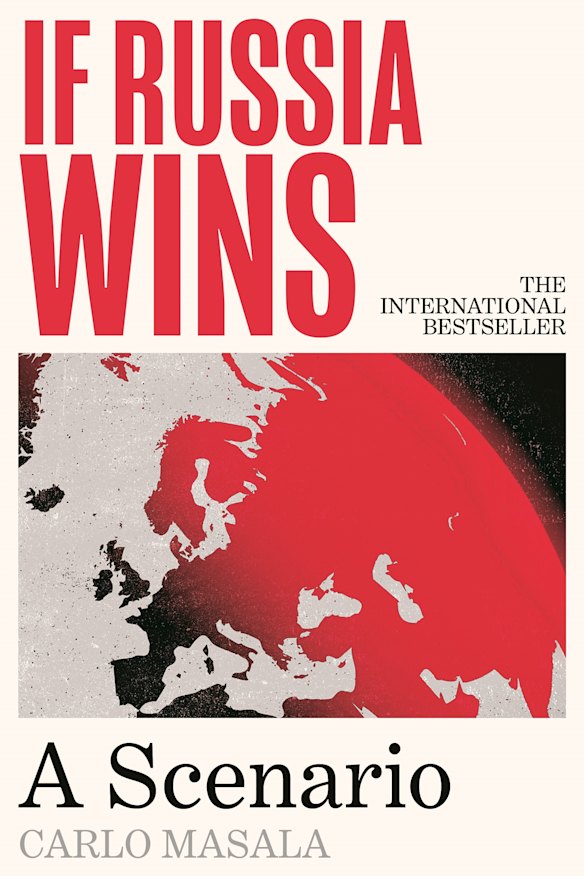
The thought of Russia achieving its aims in Ukraine is not one that most of us want to entertain. But forearmed is forewarned. Drawing on his knowledge of scenario-based strategising and international affairs, Carlo Masala imagines a near future where Russia launches a stealthy invasion of Estonia as a step in a larger campaign to restore the Russian empire to its former “glory”. Integral to the scenario are the mind games the Russians play with the NATO countries, successfully bluffing that they will use nuclear weapons to achieve their ends.
There’s a chilling plausibility to this playbook, especially Masala’s vision of how economic pressures in Europe and the US, and their fear of another world war led them to sell out Ukraine and leave them unwilling to defend Estonia. Equally disturbing is the way Russia and China team up to dethrone the US as a world superpower and render NATO ineffectual. This fast-moving, dramatised simulation plunges readers into the thick of events, forcing us to confront a reconfigured globe in which democratic institutions are rendered impotent by dictatorial alliances.
Footy Country
Cory White
Hardie Grant, $65
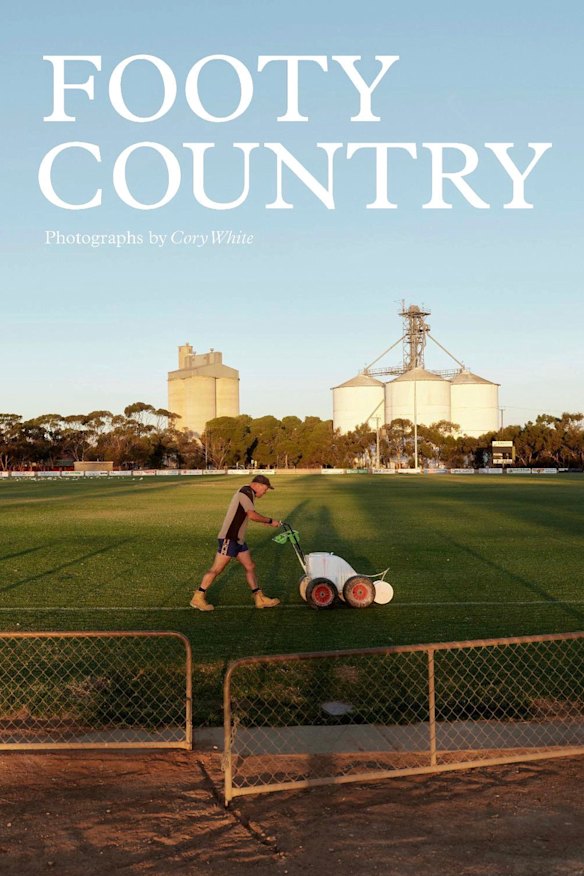
Perhaps the most telling and poignant of all the photographs in this album about the spirit of country football is a pair of discarded, mud-covered boots and soggy socks. It speaks volumes of the game just played, the tough conditions and the joyful slog of it. There’s little text in this collection because the photographs are so eloquent – the bug-eyed players in the clubrooms after a game, the keen supporters in the stands, the women and men in the club kitchens preparing food, the little kids revelling in the drama from the sidelines.
A quote from AFL legend Tom Hafey says it all: “If I could see a set of goal posts, I knew the town was alright. It had a footy club.” This is what Footy Country is about. The way a team feeds its community and the way the community feeds its grassroots club.
The Booklist is a weekly newsletter for book lovers from Jason Steger. Get it delivered every Friday.

